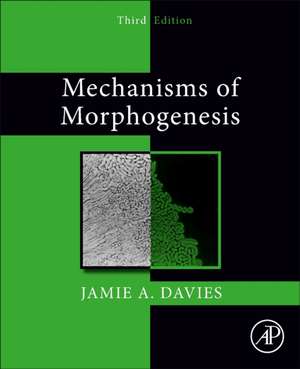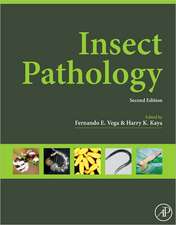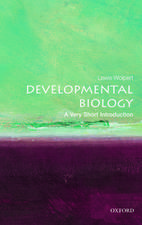Mechanisms of Morphogenesis
Autor Jamie A. Daviesen Limba Engleză Paperback – 14 iun 2023
Newly added chapters feature case-study-driven discussions of morphogenesis in natural embryos and organoids, and illustrate how pathological morphogenesis can generate variants of body form. This edition has also been updated with analysis of large-scale and scale-invariant mechanisms, for example, morphogenesis by differential growth in mechanically connected tissues.
- Includes over 200 full color figures and charts
- Offers an integrated view of theoretical developmental biology and computer modeling with laboratory-based discoveries
- Includes applied, case-study-driven discussion of experimental techniques
- Is organized around principles and mechanisms, using them to integrate discoveries from a range of organisms and systems across new applications
- Covers recent developments in morphogenesis research, including morphogenesis in organoids, other engineered tissues, and an analysis of large-scale and scale-invariant mechanisms
| Toate formatele și edițiile | Preț | Express |
|---|---|---|
| Paperback (1) | 715.91 lei 5-7 săpt. | +89.37 lei 4-10 zile |
| ELSEVIER SCIENCE – 14 iun 2023 | 715.91 lei 5-7 săpt. | +89.37 lei 4-10 zile |
| Hardback (1) | 515.63 lei 5-7 săpt. | |
| ELSEVIER SCIENCE – 18 apr 2013 | 515.63 lei 5-7 săpt. |
Preț: 715.91 lei
Preț vechi: 929.97 lei
-23% Nou
Puncte Express: 1074
Preț estimativ în valută:
136.99€ • 143.41$ • 113.35£
136.99€ • 143.41$ • 113.35£
Carte tipărită la comandă
Livrare economică 31 martie-14 aprilie
Livrare express 28 februarie-06 martie pentru 99.36 lei
Preluare comenzi: 021 569.72.76
Specificații
ISBN-13: 9780323999656
ISBN-10: 0323999654
Pagini: 532
Dimensiuni: 191 x 235 x 31 mm
Greutate: 1.07 kg
Ediția:3
Editura: ELSEVIER SCIENCE
ISBN-10: 0323999654
Pagini: 532
Dimensiuni: 191 x 235 x 31 mm
Greutate: 1.07 kg
Ediția:3
Editura: ELSEVIER SCIENCE
Public țintă
Biochemists, developmental biologists, cellular biologists, geneticists ; Clinicians; graduate and medical studentsCuprins
Section I: Introduction
1. General introduction – the aims and structure of this book.
2. Key principles of morphogenesis
3. The power and limitations of self-assembly
Section II: Cell shape and the cell morphogenesis
4. Morphogenesis of individual cells
5. Animal cell shape: the importance of the cytoskeleton
6. Cellular morphogenesis in plants
Section III: Cell Migration
7. Cell migration in development: a brief overview
8. The nanomachinery of locomotion
9. Guidance by chemotaxis
10. Guidance by galvanotaxis
11. Guidance by contact
12. Waypoint navigation in the embryo
13. Cooperative migration of mesenchymal cells
14. Condensation of cells
Section IV: Epithelial Morphogenesis
15. The epithelial state: a brief overview
16. Neighbour exchange and convergent extension
17. Closure of holes
18. Invagination and evagination
19. Epithelial fusion
20. Epithelial branching
21. Boundaries to epithelial movement
Section V: Morphogenesis by cell proliferation and death
22. Growth, proliferation and death: a brief overview
23. Morphogenesis by orientated cell division
24. Morphogenesis by elective cell death
Section VI: Morphogenesis in context
25. From mechanisms to morphology: a brief overview
26. Morphogenesis in embryos: some illustrative examples
27. Morphogenesis in organoids, embryoids and engineered tissues
28. Pathological morphogenesis
Section VII: Modelling morphogenesis
29. Modelling morphogenesis: a brief overview
30. Mechanical and mathematical models of morphogenesis
31. Modelling using living cells – tissue engineering and synthetic morphology
Section VIII: Conclusion and perspectives
32. Conclusion and perspectives
1. General introduction – the aims and structure of this book.
2. Key principles of morphogenesis
3. The power and limitations of self-assembly
Section II: Cell shape and the cell morphogenesis
4. Morphogenesis of individual cells
5. Animal cell shape: the importance of the cytoskeleton
6. Cellular morphogenesis in plants
Section III: Cell Migration
7. Cell migration in development: a brief overview
8. The nanomachinery of locomotion
9. Guidance by chemotaxis
10. Guidance by galvanotaxis
11. Guidance by contact
12. Waypoint navigation in the embryo
13. Cooperative migration of mesenchymal cells
14. Condensation of cells
Section IV: Epithelial Morphogenesis
15. The epithelial state: a brief overview
16. Neighbour exchange and convergent extension
17. Closure of holes
18. Invagination and evagination
19. Epithelial fusion
20. Epithelial branching
21. Boundaries to epithelial movement
Section V: Morphogenesis by cell proliferation and death
22. Growth, proliferation and death: a brief overview
23. Morphogenesis by orientated cell division
24. Morphogenesis by elective cell death
Section VI: Morphogenesis in context
25. From mechanisms to morphology: a brief overview
26. Morphogenesis in embryos: some illustrative examples
27. Morphogenesis in organoids, embryoids and engineered tissues
28. Pathological morphogenesis
Section VII: Modelling morphogenesis
29. Modelling morphogenesis: a brief overview
30. Mechanical and mathematical models of morphogenesis
31. Modelling using living cells – tissue engineering and synthetic morphology
Section VIII: Conclusion and perspectives
32. Conclusion and perspectives
Recenzii
"Davies retains from the first edition the concentration on morphogenesis itself…with other aspects of development taken for granted, and the organization that progresses in size from the sub-cellular systems critical for larger scale morphogenesis to mechanisms that concern whole population of cells… to keep the textbook manageable, he has presented some material more succinctly, such as the morphogenesis of sub-cellular structures." --ProtoView.com, January 2014







